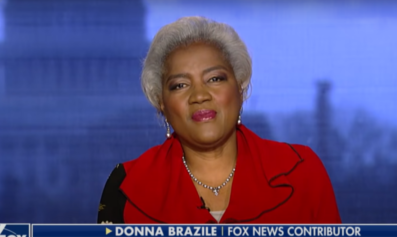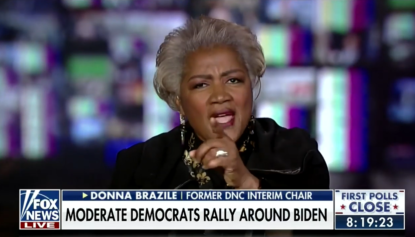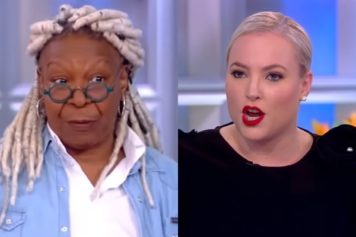Former Democratic National Committee Chairwoman Donna Brazile recently traveled to Miami to promote her new bestselling book “Hacks” which, among other things, claims Brazile was treated dismissively by the people in charge of Hillary Clinton’s failed presidential campaign.
Thoroughly unrepentant about the furor her highly critical tell-all tome is causing in Democratic Party circles, and proudly noting that “Hacks” made the New York Times best-seller list hours earlier, Brazile was in an effusive mood on the evening of Nov. 15 as she spoke to Atlanta Black Star correspondent Blair S. Walker.
Thanks for giving Atlanta Black Star readers your perspective on “Hacks – The Inside Story of the Break-ins and Breakdowns That Put Donald Trump in the White House.”
Absolutely. Thank you for having me. I’m one of your followers.
The word `Hacks’ could refer to Russian interference in the 2016 presidential election, or it could be a backhanded slap at the folks who ran Hillary Clinton’s failed Democratic campaign. Is it the latter?
It could also be used to define someone who like myself who’s been involved in politics for over 40 years. But the reason why I called it Hacks is because the 2016 election will go down as the most disruptive election in our lifetime. Because the country was under attack, a cyber attack. And it’s very difficult to detect what’s happening in cyberspace unless you see footprints, or what I call “marks.” And the Democratic Party was under attack for well over a year before we even detected it. And as a result of that, it corrupted our files, it allowed a foreign government to have access to all of our data, voter data, or donor base. And so hacking, it was the hacking of our election, not just the political hacks that are often involved in politics.
Were you mad as hell when you wrote “Hacks”? Is this tome about Donna Brazile getting revenge on the Clinton folks, or is there more to it than that?
I was sad. Because I — when the election was over with, I couldn’t go home and figure out what’s next. I had to go back to the office, I had to go back to work. I had to go back and tell the staff that we still had work to do, we had recounts across the country that we had to do. We had to continue to raise money, I still had debts and obligations. And so when I wrote the book after going around the country to host future forums, I kept asking the Clinton campaign, “Are you going to write the autopsy, are you going to write a definitive account of what happened?” And they kept blowing me off, the way they blew me off during the campaign. And I said, you know what, if you don’t write this book, I feel obligated to write this book. So this is my obligation to tell the story, my story, of what happened. Now this is not the definitive story. Hillary has written her book which, by the way, I recommend people read. I read it. Joe Biden has just written a book, which I recommend that people read. Barack Obama, Bernie Sanders — read ’em. Read ’em all! Come to your own conclusions. But the fact that I served as chair of the party, as a result of hacking, and I experienced seven months as [chair] in one of the most severe cyberattacks on the American political system, I wanted to tell that story.
What do you think will be the main takeaway for Atlanta Black Star readers after reading your book?
That if you decide to get involved in politics, make sure you have some degree of cyber literacy. That you know exactly how to navigate the political landscape because 2016 has changed our political landscape forever.
There’s been speculation that “Hacks” was an effort by Donna Brazile to redeem her reputation with the Democratic Party’s liberal wing. True? Off the mark?
I don’t know why I should redeem myself. I am a Black woman, and if anybody looked at the polls recently, and looked at what happened last Tuesday, November 7, Black women have been the backbone of the Democratic Party. We have been in the forefront, we have been on the sidelines and we’ve been in the background. I don’t have to redeem my reputation — I walked into the room with over 21 political cycles. Twenty-one! I walked into the room with more experience than anybody probably on the face of this planet when it comes to politics. I started at the age of 9! So, no, I’m not going to redeem myself, I’m just going to tell my story and quote Maya Angelou, who said that an untold story is a great agony, a great burden. That burden has been lifted. I’ve told my story.
Last year, you quit your role as a CNN contributor after being accused of giving Hillary Clinton an early peek at CNN debate questions. But in “Hacks” you firebomb Clinton and her campaign. Why the dramatic change in allegiance?
Well, there’s no firebomb in my book! There’s a wakeup call in my book. And let me just say this, I quit CNN because CNN wanted me to admit to something I didn’t do. They didn’t give me any debate questions. What I meant in the book is that I was fair to both candidates. That I was under a lot of pressure to increase the number of debates, by which CNN perceived the, quote-unquote, what I called the expansion of our debate schedule at town halls and so forth. And that I had worked with Roland Martin to increase diversity. I wanted TV One. I am a Black woman, I wanted to talk about the death penalty, we had not talked about criminal justice reform. And I wanted to have these conversations. I also said I apologized, because when Wikileaks decided to put out my email to someone in the Clinton campaign, they made a decision to put out that email, but no decision was made to put out my email to the Bernie Sanders campaign. So I had to rely on Bernie’s people, and their recollection, to tell the story as well that I treated them with respect as well. In fact, I even say in the book that I even treated the Republicans with respect. There’s no bombshell there, it’s just the truth.
You’ve accused the Clinton campaign folks of treating you like `Patsy the Slave.’
I did.
Why that name?
Well … that’s what it felt like. It felt like they were condescending, like they were arrogant, that someone with my years of experience … Now, mind you, I’m not the greatest political geek when it comes to data and algorithms. I did not grow up in the data/algorithm era, even though I did work for Al Gore. I grew up when you went down the street to Mister Joe’s house or Miss Sally’s house. You knocked on doors and said, “I need your help, would you vote for me?” And so there’s a difference in style. It’s not a difference in ultimately what wins an election. They [the Clinton campaign] had data modeling and I kept saying, “But our system was corrupted by the Russians!” How do I know they’re going to call Mister Joe and Miss Sally? Because Mister Joe and Miss Sally might have been removed from the list! So I wanted the old-school method to be with the new-school. It’s liking having a new dance with the old song. And they didn’t want that. It was clear to me that they didn’t like it, and so I felt like I was Patsy the Slave. They’re whipping me, but they weren’t really helping me.
Democrats sometimes seem to generally treat black voters like Patsy the Slave when there isn’t a major election on the horizon. Do you feel the Democrats regularly take us for granted and are often condescending?
You know, I worked on so many campaigns, I can tell you the campaigns almost verbatim, the one that understood that, if you go out there four or five months before an election and say, “I need your help,” versus four or five days out. … I don’t like that four or five days out. What happens is that people look at the polls and say, well, 90 percent of black people will vote for Al Gore. I don’t know about that! I want to talk to them, can we talk to them? I mean, I heard people after the election say I didn’t vote for Hillary, I didn’t go out and vote because I thought she was going to win. No American should be taken for granted. No white person, no Black person, no Hispanic and anybody in between. Every voter should asked directly, “Will you support my candidate?”
You’ve been a major Democratic operative for decades, been involved with successful campaigns.
And a lot of unsuccessful, too. I got a lot of them under my belt.
Why were the Clinton folks so dismissive of your wisdom and experience?
I don’t know if Hillary ever found out. I think Hillary probably was surprised last week that I had, uh, that I was treated that way. I saw her on one TV show and she said, “That doesn’t (sound familiar to me).” I assumed that, and I never wanted to break, quote-unquote, the barrier, you know? When a candidate is out there running and they are tired, I never went up and said, “Hillary, come here! Lemme pull you over to the side.” I don’t do that. I [have been] a campaign manager. I tried to go through Robby [Robert E. Mook]. I tried to go straight to Robby. He was the campaign manager, and I’d say, “Robby, from one campaign manager to another, let’s talk. Let’s have this conversation.” Here’s a good example: In the book I write about begging them for eight million dollars, and they gave me two. I said, “We have 10 weeks between now and the end of the election. I should get a million a week, I’m raising the money! Give me eight, I’ll cut you slack.” And they gave me two! Now how do you feel about that when Donald Trump is saying [to the Black community], “What the hell you have to lose?” And here I am the chair of the party, I’m an experienced political strategist and I cannot answer him with an ad, or with bumper stickers, or posters, or something in the beauty parlors. I have to write a column, because that’s all I have. I don’t have any money, and this is the money that I am raising, so that’s why I raised my voice at them. And remember in the book and I hope your readers will read this book, I said — and I thought this was a good line — my best friend said, `Donna, don’t cuss the [Clinton campaign] kids out, because you’ll shut them down. Well, I did that for two weeks. I didn’t cuss them out. But by the third week I had a little hot sauce dripping [points to her lips] — I did cuss them out.
“Saturday Night Live” recently panned Democratic leadership as old and out of touch. Accurate, or bald-faced ageism from SNL’s writing staff?
Look, when you look on TV and see the people who are standing up and speaking up and all that, you see what I call the familiar faces of the Democratic Party. As somebody who’s 57 years old, I know my time might have gone. But let me say this: The answer to our problem is not to ask people to leave the stage, it’s to say, “Scoot over! Scoot over and make room for others.”


